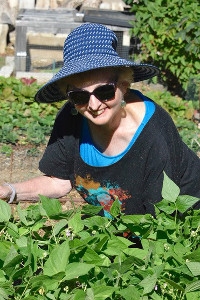Digging in the “Dirt”: Searching for Microbes that Help Plants Grow in Arid Soil

Dr. Ann Hirsch
February 28 at 12:20pm in the Skelton Conference Center
Hosted by Dr. B. Scharf
Ann M. Hirsch is a broadly trained plant-microbe biologist with a strong background in nodulating and nitrogen-fixing rhizobia and other plant growth-promoting bacteria, especially microbes isolated from arid environments. She did her doctoral research at UC-Berkeley and her postdoctoral work at Harvard University. In collaboration with a number of international scientists, her lab has analyzed arid, saline, and degraded soil from countries throughout the world including Botswana, Senegal, Pakistan, Mexico, and Egypt. Much of the degradation results from continuous farming, overfertilization, and soil structure disruption. We are currently researching both plant and soil microbiomes, particularly legume root nodule microbiomes, using molecular biology/genetics, and various -omics approaches to find microbes that enhance plant growth through biocontrol, biofertilization, soil restoration, and plant growth promotion. In addition, we pre-test any potential plant-growth promoting bacteria (PGPB) for virulence and negative effects on plant hosts. Plants are initially in growth chambers and the greenhouse and then under simulated field conditions with either single microbes or PGPB consortia. The ultimate goal of the scientific research in the Hirsch laboratory is to reduce the overuse of synthetic fertilizers, which pollute the environment, by finding microbes effective for not only sustainable agriculture, but also restoring soil health.
Experiments in molecular plant biology and plant-microbe biology are frequently performed with model organisms and under artificial conditions. However, extrapolating such data into natural conditions, particularly soil, can be difficult. We elected to search directly for microbes from arid soils or from plants grown in natural environments to find indigenous, plant growth promoting bacteria (PGPB), which in conjunction with nitrogen-fixing bacteria could promote plant growth and at the same time restore degraded soils. Cultivation-independent approaches were used to get an inventory of “who’s there”, but cultivation-dependent methods to isolate bacteria were also undertaken to find specific microbes that could be used for inoculating legume as well as non-legume plants. For example, we isolated a bacterial species from the Negev Desert in Israel that promotes corn growth and also a number of Gram-positive bacteria from both legume root nodules and rhizosphere soils, which when co-inoculated with rhizobia, enhance plant dry weight over the rhizobia-only inoculated controls. Several of these bacteria have biocontrol activity and thus protect their host from fungal infection. We have pursued studies in the mechanisms of action whereby these “helper” bacteria facilitate plant growth and also test them for potential pathogenesis against both animals and plants and also examine their genomes for the presence of virulence determinants. Our ultimate goal is to find biological organisms to replace our current dependence on synthetic fertilizers and amendments that pollute both soil and atmosphere.

This seminar will NOT be livestreamed or recorded.



